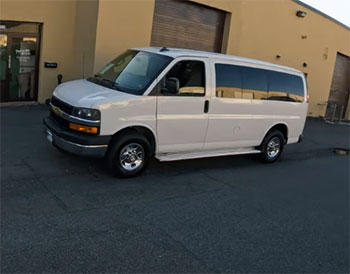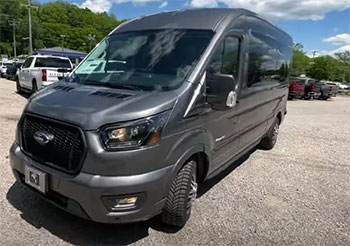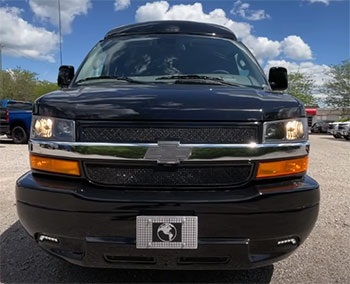As a small business owner who’s spent countless hours hauling cargo and navigating city streets, I’ve had my fair share of time behind the wheel of both the Chevrolet Express and Ford Transit. Choosing the right van is a big decision, and I’m here to share my firsthand insights to help you decide which one suits your needs. In this article, I’ll break down the key features, weigh the pros and cons, and compare these two popular full-size vans to guide you toward the best choice for your business or personal adventures.
Comparison Table: Chevrolet Express Vs. Ford Transit
| Feature | Chevrolet Express | Ford Transit |
|---|---|---|
| Starting MSRP | $43,795 | $49,495 |
| Cargo Volume (Max) | 299.4 cu. ft. | 487.3 cu. ft. |
| Engine Options | 4.3L V6 (276 hp), 4.8L-6.0L V8, 6.6L Duramax Diesel | 3.5L V6 (275 hp), 3.5L EcoBoost V6, 3.2L I-5 Diesel |
| Transmission | 6-speed or 8-speed automatic | 10-speed automatic |
| Drivetrain | Rear-wheel drive | Rear-wheel or all-wheel drive |
| Fuel Economy (City/Hwy) | 14/18 mpg (V6) | 15/19 mpg (V6) |
| Towing Capacity | Up to 10,000 lbs | Up to 7,500 lbs |
| Seating Capacity | Up to 12 (passenger) | Up to 15 (passenger) |
| Payload Capacity | Up to 3,280 lbs | Up to 3,561 lbs |
| Safety Features | Basic airbags, stability control, rearview camera | Advanced Co-Pilot360, optional adaptive cruise, lane departure warning |
| Infotainment | Basic Chevrolet Infotainment, optional Bluetooth | SYNC3, standard Bluetooth, Apple CarPlay/Android Auto |
| Warranty | 3 yr/36,000 mi basic, 5 yr/60,000 mi powertrain | 3 yr/36,000 mi basic, 5 yr/60,000 mi powertrain |
My Experience With the Chevrolet Express

I’ve driven the Chevrolet Express for years, and it’s like an old friend who’s reliable but not exactly full of surprises.
This van has been around since the mid-90s, and its design hasn’t changed much, which is both its charm and its Achilles’ heel.
I’ve used it for everything from delivering equipment to road-tripping with friends, and it’s a workhorse that gets the job done.
The Express comes in cargo and passenger configurations, with engine options ranging from a 4.3L V6 to a beefy 6.6L Duramax diesel. Its body-on-frame construction gives it a rugged feel, and the spacious interior is great for hauling gear or people.
But the lack of modern tech and its dated design can feel like stepping into a time machine.
The Express’s interior is functional but basic. I found the seats comfortable, especially the optional leather ones with electric adjustments, but the dashboard and infotainment system scream early 2000s. Driving it is straightforward, with a soft suspension that makes long hauls tolerable, though it can feel floaty on winding roads.
The Express shines when you need to tow heavy loads—up to 10,000 pounds with the right setup. I’ve towed trailers loaded with equipment, and it handled the weight like a champ. Fuel economy isn’t its strong suit, averaging 14 mpg in the city and 18 on the highway with the V6, but that’s the trade-off for its power.
Where the Express really stands out is its durability. I’ve put over 200,000 miles on mine, and with regular maintenance, it’s still running strong. Mechanics love it because it’s simple to work on, and parts are cheap and widely available.
However, the lack of all-wheel drive and advanced safety features like adaptive cruise control can be a dealbreaker if you’re driving in tricky conditions or want cutting-edge tech. For me, the Express is the go-to if you value reliability and towing power over bells and whistles.
Pros Of the Chevrolet Express
- Affordable Price Point: Starting at $43,795, the Express is significantly cheaper than the Ford Transit, saving you about $5,700 upfront. This makes it a great option if you’re on a tight budget or buying a fleet for your business.
- Proven Reliability: The Express’s design hasn’t changed much in decades, and that’s a good thing. Its simple, robust construction means fewer things go wrong, and I’ve seen these vans hit 300,000 miles with proper care.
- Powerful Towing Capacity: With a max towing capacity of 10,000 pounds, the Express outperforms the Transit in hauling heavy trailers. I’ve towed large equipment without breaking a sweat.
- Spacious Cargo Area: Offering up to 299.4 cubic feet of cargo space, it’s plenty roomy for most business needs. I’ve packed it with tools, materials, and even furniture with ease.
- Comfortable Seating: The optional leather seats with electric adjustments are surprisingly plush for a work van. Long drives feel less taxing, though passengers might experience motion sickness due to the soft suspension.
- Low Maintenance Costs: Parts are inexpensive and widely available, and the Express’s straightforward design makes repairs a breeze. My local mechanic always has what I need in stock.
- Multiple Engine Options: From the base 4.3L V6 to the 6.0L V8 and Duramax diesel, you’ve got choices to match your power needs. The V8s are especially great for heavy-duty tasks.
Cons Of the Chevrolet Express
- Outdated Technology: The infotainment system is bare-bones, with a small screen and limited features. Bluetooth is optional, and there’s no standard Apple CarPlay or Android Auto, which feels archaic compared to modern vans.
- No All-Wheel Drive: The Express only offers rear-wheel drive, which can be a hassle in snowy or slippery conditions. I’ve had to chain up in winter, which isn’t ideal.
- Lower Fuel Economy: At 14/18 mpg (city/highway), it’s less efficient than the Transit. My fuel bills add up, especially on long trips.
- Limited Configurability: With only one body length and two roof heights, customization is limited. I sometimes wished for a high-roof option for easier standing room.
- Basic Safety Features: You get airbags, stability control, and a rearview camera, but advanced features like lane departure warnings or adaptive cruise control are either optional or unavailable.
- Dated Interior Design: The cabin feels like a relic from the 90s. Plastic surfaces and a clunky layout make it less inviting than the Transit’s modern cockpit.
- Handling Challenges: The soft suspension and body-on-frame design make it less agile, especially on curvy roads. I’ve felt it sway more than I’d like during sharp turns.
My Experience With the Ford Transit

The Ford Transit feels like the new kid on the block, even though it’s been around for a while.
I’ve driven it for business deliveries and even converted one for a weekend camper.
Its modern design, unibody construction, and tech-heavy approach make it a stark contrast to the Express.
The Transit offers a range of configurations—multiple body lengths, roof heights, and even all-wheel drive.
Its engine lineup includes a 3.5L V6, a powerful EcoBoost V6, and a diesel option, paired with a smooth 10-speed automatic transmission. It’s a van that feels more like a modern SUV than a traditional workhorse.
Driving the Transit is a pleasure. The steering is precise, and the unibody construction makes it handle better than the Express, especially in tight city streets.
I’ve maneuvered it through crowded parking lots with ease, thanks to its tighter turning radius. The cabin is spacious, with more front headroom and legroom, and the SYNC3 infotainment system is a standout—standard Bluetooth, Apple CarPlay, and Android Auto make connectivity a breeze.
Safety features like the optional 360-degree camera and adaptive cruise control have saved me from a few close calls. However, the higher starting price of $49,495 and some reliability concerns have made me question its long-term value.
The Transit’s cargo space is a game-changer, with up to 487.3 cubic feet in the high-roof, extended models. I’ve hauled oversized equipment that wouldn’t fit in the Express. Fuel economy is slightly better at 15/19 mpg (city/highway), and the optional all-wheel drive is a lifesaver in bad weather.
But I’ve heard grumbles about transmission issues and the complexity of repairs, which can be costly. For me, the Transit is ideal if you prioritize tech, versatility, and modern comfort, but it comes at a premium.
Read More: My Thoughts On Acura MDX Vs. Jeep Grand Cherokee
Pros Of the Ford Transit
- Massive Cargo Capacity: With up to 487.3 cubic feet, the Transit dwarfs the Express in cargo space. I’ve loaded it with bulky items that would’ve required multiple trips in other vans.
- Modern Technology: The SYNC3 system is intuitive, with standard Bluetooth and smartphone integration. I love how easy it is to sync my phone for hands-free calls and navigation.
- All-Wheel Drive Option: Available AWD makes it a better choice for snowy or off-road conditions. I’ve driven through icy patches without slipping, which gives peace of mind.
- Multiple Configurations: With various body lengths and roof heights, you can tailor the Transit to your needs. I’ve used a high-roof model for a camper conversion, and it’s a game-changer.
- Advanced Safety Features: The optional Co-Pilot360 suite includes lane departure warnings, adaptive cruise control, and a 360-degree camera. These have made my drives safer and less stressful.
- Better Fuel Economy: At 15/19 mpg, it’s slightly more efficient than the Express, saving me a bit at the pump over long hauls.
- Smooth Handling: The unibody construction and 10-speed transmission make it feel nimble and responsive, even when fully loaded.
Cons Of the Ford Transit
- Higher Price Tag: Starting at $49,495, it’s pricier than the Express. The cost can add up quickly with optional features, which might strain your budget.
- Reliability Concerns: I’ve heard reports of transmission and turbo engine issues, especially with the EcoBoost models. Repairs can be expensive due to the Transit’s complex design.
- Lower Towing Capacity: Capped at 7,500 pounds, it falls short of the Express’s towing prowess. I’ve had to rethink towing plans with heavier loads.
- Complex Repairs: The unibody design and advanced tech mean repairs often require specialized tools and mechanics, driving up costs compared to the Express.
- Less Durable Frame: While the unibody improves handling, it’s less rugged than the Express’s body-on-frame for heavy-duty abuse over time.
- Optional Features Cost Extra: Many desirable features, like HID headlights or keyless entry, aren’t standard and inflate the price. I was surprised by how quickly the bill added up.
- Taller Profile: The high-roof models can be harder to park in low-clearance areas, which was an issue for me in urban settings.
Digging Deeper: Performance and Power
Let’s talk about what’s under the hood, because that’s where these vans really show their personality. The Chevrolet Express offers a range of engines that feel like they’re built for brute strength. The base 4.3L V6 pumps out 276 horsepower and 298 lb-ft of torque, which is solid for most tasks. If you need more grunt, the 4.8L to 6.0L V8s deliver up to 341 horsepower, and the 6.6L Duramax diesel is a beast for towing or heavy loads. I’ve hauled construction materials with the 6.0L V8, and it barely flinched. The downside? The 6-speed or 8-speed automatic transmissions feel a bit clunky compared to modern standards, and the rear-wheel-drive setup can be a liability in wet or snowy conditions.
The Ford Transit, on the other hand, feels more refined. Its standard 3.5L V6 produces 275 horsepower and 260 lb-ft of torque, but the optional 3.5L EcoBoost V6 cranks out 310 horsepower and 400 lb-ft of torque, giving it a lively kick. The 3.2L diesel is a solid choice for efficiency, though I found it less exciting to drive. The 10-speed automatic transmission is a standout, shifting smoothly and helping maximize fuel economy. I’ve driven the Transit with AWD through muddy job sites, and it handled better than I expected. However, some owners report issues with the EcoBoost’s turbo system, which can be a pricey fix.
When it comes to towing, the Express takes the crown. Its 10,000-pound capacity is a boon for businesses hauling trailers or heavy equipment. I once towed a loaded trailer across state lines, and the Express powered through without complaint. The Transit’s 7,500-pound limit is respectable but falls short for heavy-duty needs. For city driving or long hauls, the Transit’s nimble handling and AWD option make it more versatile, but the Express’s raw power is hard to beat if towing is your priority.
Interior and Comfort: Where You’ll Spend Your Time
The interior of a van is your office, your lounge, and sometimes your home on the road. The Chevrolet Express’s cabin is practical but dated. The seats are comfortable, especially with the optional electric adjustments, but the dashboard looks like it’s stuck in 1995. The infotainment system is basic, with a small screen and limited connectivity options. I had to add an aftermarket Bluetooth adapter to stream music, which was a hassle. The cargo area is spacious, but the lack of a high-roof option means I’m often crouching when loading gear in the back.
The Ford Transit’s interior feels like a modern office. The SYNC3 system is a joy to use, with a large touchscreen, standard Bluetooth, and smartphone integration that makes navigation and calls seamless. I’ve spent hours in the driver’s seat, and the extra headroom and legroom make a big difference. The high-roof models let me stand upright in the back, which was a lifesaver during my camper conversion. However, the Transit’s interior materials, while modern, can feel less durable than the Express’s rugged setup. I’ve noticed some wear on the plastic panels after heavy use.
Both vans offer decent passenger configurations, with the Express seating up to 12 and the Transit up to 15. For cargo, the Transit’s massive 487.3 cubic feet blows the Express’s 299.4 cubic feet out of the water. I’ve fit oversized pallets in the Transit that wouldn’t have stood a chance in the Express. But the Express’s longer wheelbase makes it better for super-long items, like pipes or lumber. It’s a trade-off: the Transit offers more volume, but the Express handles length better.
Safety and Technology: Staying Safe and Connected

Safety is non-negotiable, especially when you’re hauling precious cargo or passengers.
The Chevrolet Express covers the basics: airbags, stability control, traction control, and a rearview camera. Optional features like blind-spot monitoring and lane departure warnings are available but not standard, and there’s no adaptive cruise control.
I’ve driven the Express in heavy traffic and wished for more advanced driver aids. Its simplicity is great for reliability, but it feels behind the times.
The Ford Transit steps up with the optional Co-Pilot360 suite, which includes lane departure warnings, automatic emergency braking, and adaptive cruise control.
The 360-degree camera is a godsend when parking in tight spots—I’ve avoided dings in crowded lots thanks to it. Standard Bluetooth and keyless entry add convenience, though some features, like HID headlights, cost extra.
The Transit’s tech makes it feel safer and more user-friendly, but the added complexity can mean higher repair costs if something goes wrong.
Cost of Ownership: What’s the Long-Term Deal?
Owning a van isn’t just about the sticker price; it’s about the long game. The Chevrolet Express’s lower starting MSRP ($43,795) gives it an edge, especially for small businesses or budget-conscious buyers. Its simple design and widespread parts availability keep maintenance costs low. I’ve spent less on repairs for my Express than I expected, even with high mileage. However, fuel costs can add up, and the lack of modern efficiency tech doesn’t help.
The Ford Transit’s higher starting price ($49,495) stings, and optional features like AWD or advanced safety systems can push the cost even higher. Fuel economy is slightly better, which has saved me a few bucks on long trips. But repairs can be a headache—specialized parts and complex systems mean higher shop bills. I’ve heard from other owners about costly transmission fixes, which makes me wary. If you’re leasing or buying new, the Transit’s tech and versatility might justify the cost, but the Express is the frugal choice.
Which Van Fits Your Life?
Choosing between the Chevrolet Express and Ford Transit depends on your priorities. If you need a reliable, affordable van with towing power and low maintenance costs, the Express is tough to beat. It’s not flashy, but it’s a proven platform that’ll last for years with proper care. If you want a modern, tech-savvy van with massive cargo space and AWD for versatility, the Transit is your pick. I’ve loved the Transit’s driving dynamics and features, but its price and potential repair costs give me pause.
For me, the Express has been a loyal companion for heavy-duty tasks, while the Transit shines for flexibility and comfort. Think about your budget, cargo needs, and driving conditions. Test-drive both if you can—it’s the best way to feel the difference. Whatever you choose, both vans are built to work hard, but they cater to slightly different needs.
Read More: My Thoughts On GMC Terrain Vs. Ford Escape
Frequently Asked Questions (FAQ)
Higher starting price, potential reliability issues with the EcoBoost engine and transmission, and costly repairs due to complex design.
Yes, the Express is known for its robust construction and can last over 300,000 miles with regular maintenance.
The Chevrolet Express is the direct competitor to the Ford Transit in the full-size van market.
Absolutely, with proper care, many Express vans exceed 300,000 miles, thanks to their durable design.
Conclusion: For Your Next Van
You’re at a crossroads, and I’ve been there: the Chevrolet Express and Ford Transit are both solid choices, but they cater to different needs. If you’re after a budget-friendly, reliable van that can tow like a beast and keep maintenance costs low, the Express is your trusty sidekick. If you crave modern tech, massive cargo space, and the flexibility of AWD, the Transit’s your ticket to a smoother, more connected ride. Weigh your priorities—budget, cargo, tech, or towing—and take one for a spin. You’ll know which van feels like home.

